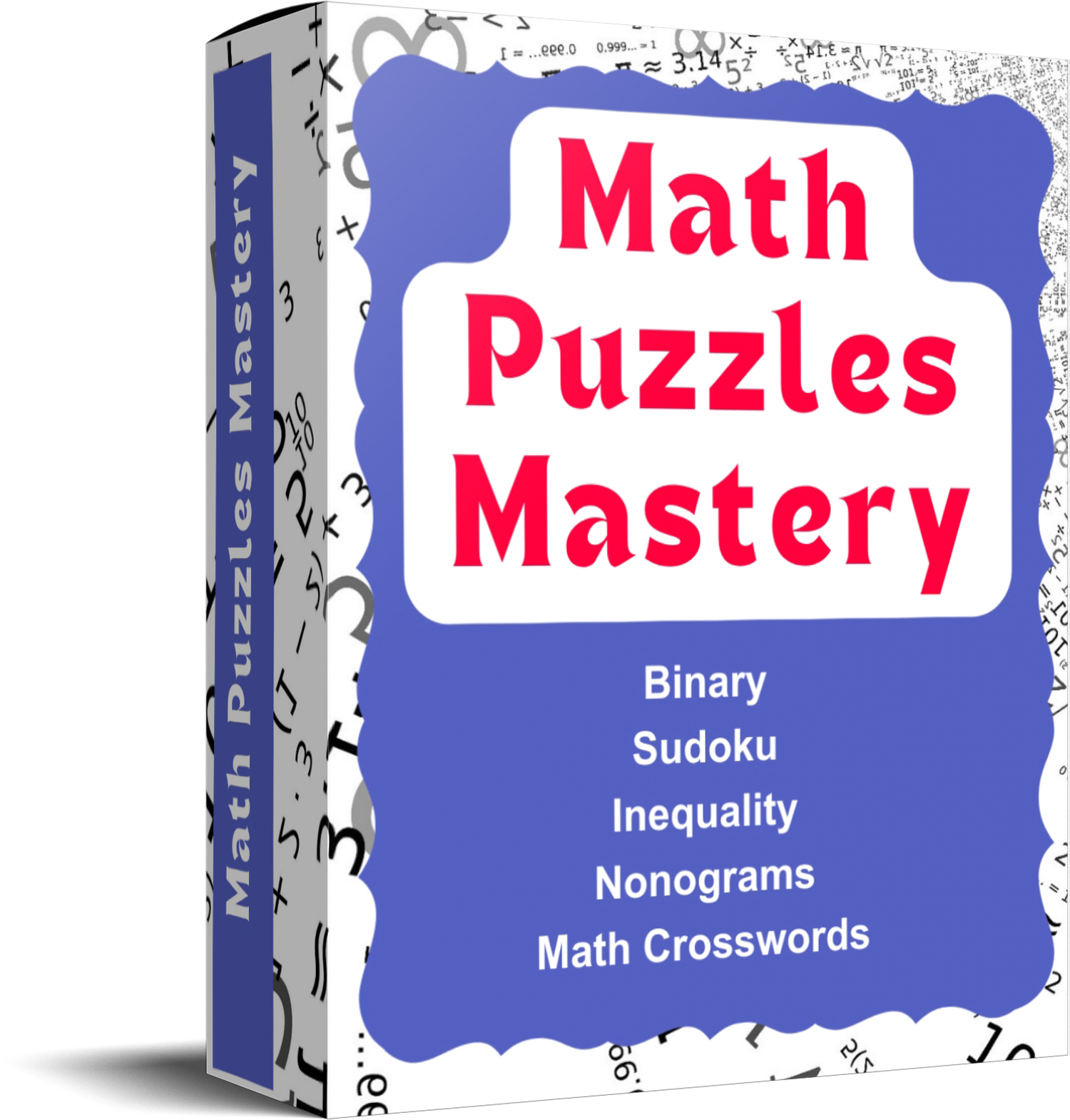Mastering math puzzles requires a focused approach to problem-solving and logical thinking. With practice and persistence, you can enhance your problem-solving skills and confidently tackle mathematical challenges.

Credit: muncheye.com
Introduction To Math Puzzles
Math puzzles are not only a fun way to engage with numbers, but also a great tool to enhance problem-solving skills and critical thinking. These puzzles provide an opportunity to apply mathematical concepts in a practical manner, making the subject more relatable and enjoyable.
Definition Of Math Puzzles
Math puzzles are challenges or problems that involve numeric calculations, logical reasoning, and creative thinking. These puzzles can be presented in various formats, such as riddles, brainteasers, or visual puzzles. While their complexity may vary, the common goal of math puzzles is to find a solution using mathematical principles and logical deductions.
Benefits Of Solving Math Puzzles
Engaging in math puzzles offers several benefits that go beyond simply sharpening your mathematical skills. Here are some advantages of regularly solving math puzzles:
- Enhances problem-solving abilities: Math puzzles require you to think critically and come up with innovative solutions. By regularly solving these puzzles, you can improve your problem-solving abilities, which can be applied to various real-life scenarios.
- Boosts logical reasoning: Math puzzles often involve logical reasoning, where you need to analyze patterns, make deductions, and draw logical conclusions. Solving these puzzles strengthens your logical thinking skills and enhances your ability to think and reason analytically.
- Develops patience and perseverance: Math puzzles can sometimes be challenging and require perseverance to find the solution. This process teaches you the value of patience and the importance of not giving up when faced with difficulties.
- Improves mathematical understanding: When solving math puzzles, you apply mathematical concepts in a practical context. This helps solidify your understanding of these concepts and reinforces your knowledge of arithmetic, algebra, geometry, and other mathematical areas.
- Increases confidence: Successfully solving math puzzles can boost your confidence and self-esteem. It provides a sense of accomplishment and encourages you to tackle more complex challenges, both in mathematics and other subjects.
So, whether you are a student wanting to strengthen your math skills or an adult looking for an entertaining and mentally stimulating activity, solving math puzzles is an excellent way to achieve these goals. In the next sections, we will explore different types of math puzzles and delve into some specific examples that will challenge and pique your curiosity.

Credit: www.unca.edu
Types Of Math Puzzles
Math puzzles are a fun and challenging way to improve your problem-solving skills and enhance your mathematical abilities. They are not only entertaining but also help build critical thinking and logical reasoning. In this section, we will explore three main types of math puzzles: logic-based puzzles, number-based puzzles, and word problems.
Logic-based Puzzles
Logic-based math puzzles are brain teasers that require you to think logically and deduce the correct answers. These puzzles often involve a scenario or a set of conditions that you must analyze and unravel to find the solution. By applying logical reasoning, you can uncover patterns, draw conclusions, and solve complex problems. Common examples of logic-based puzzles include Sudoku, logic grid puzzles, and Einstein’s riddle.
Number-based Puzzles
Number-based math puzzles focus on numerical operations and calculations. These puzzles challenge you to manipulate numbers and use mathematical concepts to arrive at the correct answers. They can range from simple arithmetic problems to more complex algebraic equations or series patterns. Number-based puzzles help sharpen your mental math skills and enhance your ability to think critically when dealing with numbers. Some popular number-based puzzles include math crosswords, number sequences, and Missing Number puzzles.
Word Problems
Word problems combine mathematical concepts with real-life situations, requiring you to use your math skills to solve everyday problems. They often involve interpreting given information, identifying the relevant mathematical operations, and applying them to reach the solution. Word problems not only assess your mathematical knowledge but also test your ability to apply that knowledge to practical scenarios. These problems can cover a wide range of topics, from simple age or distance problems to more complex ratio and proportion or percent problems.
Now that we have explored the three main types of math puzzles – logic-based puzzles, number-based puzzles, and word problems – you can dive deeper into each category and improve your puzzle-solving abilities. Stay tuned for future posts where we will discuss specific puzzle examples in each category and provide tips to master them!
Strategies For Solving Math Puzzles
Introductory paragraphStrategies for Solving Math Puzzles: Mastering math puzzles can be a challenging and rewarding endeavor. It requires sharp problem-solving skills and a systematic approach. By employing various strategies, you can improve your ability to tackle even the most complex math puzzles. In this blog post, we will explore different techniques that can help break down problems, identify patterns, use visualizations, apply trial and error, and work backwards to solve math puzzles effectively.
Breaking Down the ProblemBreaking Down The Problem:
One effective strategy is to break down the problem into smaller, more manageable components. By simplifying the puzzle, you can focus on understanding its core elements and potential relationships. Breaking down math puzzles allows you to approach them step-by-step, reducing complexity and enabling clearer thinking.
Identifying PatternsIdentifying Patterns:
Patterns. Identifying patterns is a crucial skill for solving math puzzles. Whether it’s recognizing a sequence of numbers, a recurring arrangement, or a specific rule, patterns can provide valuable insights and solutions. By observing and analyzing the given information, you can discern recurring themes and structures, making it easier to find the missing piece in the puzzle.
Using VisualizationsUsing Visualizations:
Visualizations. Visualizing a math puzzle can greatly enhance your problem-solving abilities. Creating diagrams, graphs, or even mentally visualizing the puzzle can help you better understand the relationships and connections between different elements. Visualizations enable you to see the problem from different angles, allowing for more creative and efficient problem-solving.
Trial and ErrorTrial And Error:
Trial and Error. When facing a particularly challenging math puzzle, sometimes trial and error can be a valuable technique. By systematically trying different approaches and assessing their outcomes, you can gradually eliminate incorrect solutions and narrow down the possibilities. While this method may be time-consuming, it can ultimately lead you to the correct solution.
Working BackwardsWorking Backwards:
Working Backwards. Another effective strategy is to work backward from the desired solution. Start with the end result and mentally retrace the steps needed to reach that outcome. Breaking the puzzle down in reverse allows you to figure out the necessary intermediate steps and clues. Working backward can be particularly helpful in puzzles where the solution is elusive.
Popular Math Puzzle Games
Master math skills with popular math puzzle games. These engaging games make learning fun and help improve problem-solving abilities while sharpening mathematical prowess.
Math puzzle games are a fantastic way to sharpen your mind and have fun at the same time. These games challenge your problem-solving skills and boost your logical thinking abilities. Whether you’re a math enthusiast or simply looking to solve puzzles, popular math puzzle games like Sudoku, Crossmath, Kakuro, and KenKen offer a thrilling experience that keeps you engaged for hours.
Sudoku
Sudoku is a number-based logic puzzle game that requires you to fill a grid with numbers. The objective is to ensure that each row, column, and block contains all the numbers from 1 to 9 without repetition. Sudoku puzzles come in different difficulty levels, making it suitable for both beginners and seasoned players. By using deductive reasoning and logical analysis, you can gradually unravel the missing numbers and solve the puzzle. Sudoku tests your patience, persistence, and ability to think critically.
Crossmath
Crossmath, also known as Mathdoku, is another fascinating math puzzle game that combines elements of Sudoku and crossword puzzles. In Crossmath, you need to fill a grid with numbers while adhering to the mathematical operations given in the clues. Each row and column has a target number and operation, such as addition, subtraction, multiplication, or division. Your task is to strategically place the numbers to achieve the desired result. This game challenges your mathematical skills and reasoning abilities, making it a favorite among puzzle lovers.
Kakuro
Kakuro is a math crossword puzzle game that requires you to fill a grid with numbers, similar to Sudoku. However, instead of using single digits, you use the numbers 1 to 9 to form sums. The clues provided in the puzzle indicate the total sum for each row or column. Your goal is to figure out the correct combination of numbers that adds up to the given sum without repetition. Kakuro puzzles test your arithmetic skills, logical thinking, and ability to strategize.
Kenken
KenKen is a math and logic puzzle game that incorporates arithmetic operations and cages. The grid consists of cells grouped into cages, and each cage has a target number and operation. Your objective is to fill the grid with digits while ensuring that each row and column contains all the numbers from 1 to the grid’s size. Additionally, the numbers within each cage must combine using the indicated operation to equal the target number. KenKen puzzles challenge your mathematical and logical reasoning, as you must carefully place the numbers to satisfy all the conditions.
These popular math puzzle games offer endless hours of entertainment while honing your mathematical skills. Whether you prefer the structured logic of Sudoku, the mathematical operations of Crossmath and Kakuro, or the combination of math and logic in KenKen, these games are sure to captivate puzzle enthusiasts of all ages.
Building Math Puzzle Solving Skills
Building math puzzle solving skills is a great way to sharpen your mind and improve your problem-solving abilities. Whether you’re a student looking to excel in math or someone who simply enjoys a good challenge, mastering math puzzles can be a rewarding and fulfilling experience.
Practice Regularly
Like any skill, becoming proficient at solving math puzzles requires practice. Regularly challenging yourself with different puzzles will improve your problem-solving techniques and help you develop a systematic approach to solving problems.
Start With Easy Puzzles
When beginning your journey to mastery, it’s essential to start with easy puzzles. These puzzles serve as building blocks, allowing you to grasp fundamental concepts and develop your problem-solving skills incrementally.
Challenge Yourself With Difficult Puzzles
Once you’ve built a solid foundation, it’s time to push your limits and tackle more difficult puzzles. These complex puzzles will further enhance your critical thinking and reasoning abilities, pushing you to think outside the box and explore different problem-solving strategies.
Try Different Puzzle Types
Exploring different types of math puzzles is key to expanding your skills and keeping the learning process exciting. From number puzzles to logic puzzles, each type offers a unique challenge and helps you develop a diverse set of problem-solving techniques. By trying various puzzle types, you’ll improve your ability to analyze patterns, think logically, and apply mathematical concepts effectively.
| Resource Name | Description |
|---|---|
| Math Playground | Website offering a wide range of math puzzles and games for different skill levels. |
| Nrich | Online platform with an extensive collection of math puzzles and problem-solving activities. |
| Math is Fun | Website featuring interactive math puzzles and explanations to help deepen your understanding. |
- Strengthen your mental math skills through regular practice.
- Improve logical thinking and problem-solving abilities.
- Enhance critical thinking skills.
- Develop a systematic approach to problem-solving.
- Boost confidence in tackling math-related challenges.
Remember, the journey towards mastery may not always be easy, but with consistent effort and the willingness to embrace challenges, you can become a math puzzle-solving expert.
The Connection Between Math Puzzles And Critical Thinking
When it comes to developing critical thinking skills, math puzzles are a valuable tool. The connection between math puzzles and critical thinking is undeniable, as solving these puzzles requires logical reasoning, problem-solving skills, and analytical abilities.
Enhanced Problem-solving Skills
Math puzzles are designed to challenge individuals to think creatively and find solutions to complex problems. By engaging in these puzzles, individuals can enhance their problem-solving skills, as they are forced to think outside the box and consider different strategies to reach the correct answer.
Improved Analytical Abilities
By regularly solving math puzzles, individuals can significantly improve their analytical abilities. These puzzles typically involve patterns, sequences, and mathematical concepts that require careful analysis and attention to detail. Through practice and exposure to these types of problems, individuals can sharpen their analytical skills and become more proficient in identifying and understanding patterns and relationships.
Developing Logical Reasoning
Math puzzles provide an excellent platform for developing logical reasoning skills. The ability to think logically is essential, not only in solving math problems but also in everyday life. By engaging in math puzzles, individuals can enhance their logical reasoning abilities, becoming more adept at identifying logical sequences, making logical deductions, and applying logical strategies to problem-solving situations.
In conclusion, math puzzles serve as a powerful tool in developing critical thinking skills. Through enhanced problem-solving abilities, improved analytical skills, and the development of logical reasoning, individuals can experience significant growth and mastery in the world of math puzzles.
Math Puzzles For Educational Purposes
Math puzzles are an ingenious way to enhance mathematical learning and promote critical thinking skills among students. Incorporating puzzles in math education can make the subject more engaging, enjoyable, and effective in fostering innovative problem-solving abilities. This blog post will explore the benefits of utilizing math puzzles for educational purposes, highlighting the importance of creativity and engagement, as well as the advantages of both individual and group puzzle-solving.
Incorporating Puzzles In Math Education
By integrating math puzzles into the curriculum, teachers can create a dynamic and interactive learning environment that encourages students to actively participate in the subject matter. Puzzles provide a refreshing break from traditional teaching methods and enable students to apply their mathematical knowledge in practical and meaningful ways. These puzzles challenge students to think critically, analyze patterns, and devise strategies, essential skills that are transferrable across all areas of life.
Promoting Creativity And Engagement
Math puzzles have the power to ignite creativity in students by presenting mathematical concepts in a fun and intriguing manner. Solving puzzles requires thinking outside the box, encouraging students to explore innovative approaches and alternative problem-solving techniques. This stimulates their creativity, allowing them to see mathematics beyond just formulas and equations. Moreover, math puzzles promote engagement by capturing students’ attention and motivating them to actively participate in the learning process, fostering a love for the subject.
Individual Vs. Group Puzzles
Both individual and group puzzle-solving activities have unique advantages in enhancing math education. Individual puzzles give students the opportunity to independently explore mathematical concepts, allowing for self-paced learning and development of analytical skills. On the other hand, group puzzles promote collaboration, communication, and teamwork. When students work together to solve puzzles, they can learn from one another’s perspectives and develop problem-solving techniques through discussion and sharing of ideas.
In conclusion, incorporating math puzzles into education goes beyond the classroom by promoting critical thinking, creativity, and engagement. Whether it’s through individual or group puzzle-solving activities, students can develop essential skills that will benefit them in their academic journey and beyond. By making math enjoyable and challenging, puzzles empower students to become active participants in their own learning, leading to a deeper understanding and appreciation of mathematics.

Credit: www.madebyteachers.com
Frequently Asked Questions For Math Puzzles Mastery
What Are Some Math Puzzles For Beginners?
There are many math puzzles perfect for beginners, such as Sudoku, Kakuro, and KenKen. These puzzles help develop problem-solving skills and logical thinking while making math more fun and engaging for beginners.
How Do Math Puzzles Improve Cognitive Skills?
Math puzzles help improve cognitive skills by challenging the brain to think critically, solve complex problems, and make connections. Regular practice with math puzzles can enhance logical reasoning, analytical thinking, creativity, and pattern recognition.
Why Are Math Puzzles Important For Children’s Learning?
Math puzzles are important for children’s learning as they foster a deeper understanding of mathematical concepts, encourage problem-solving abilities, increase concentration, and promote logical thinking. They also boost confidence and motivation, making math enjoyable for children.
Conclusion
Mastering math puzzles is an exhilarating journey that expands your problem-solving skills while stimulating your mind. These puzzles provide a unique blend of fun and learning, making them a valuable tool for both children and adults. By persistently engaging in math puzzles, you develop critical thinking, logical reasoning, and strategic planning abilities.
Embrace the challenge, strengthen your mathematical prowess, and unlock a world of limitless possibilities through math puzzle mastery. Start your journey today and see the incredible benefits that await you.



